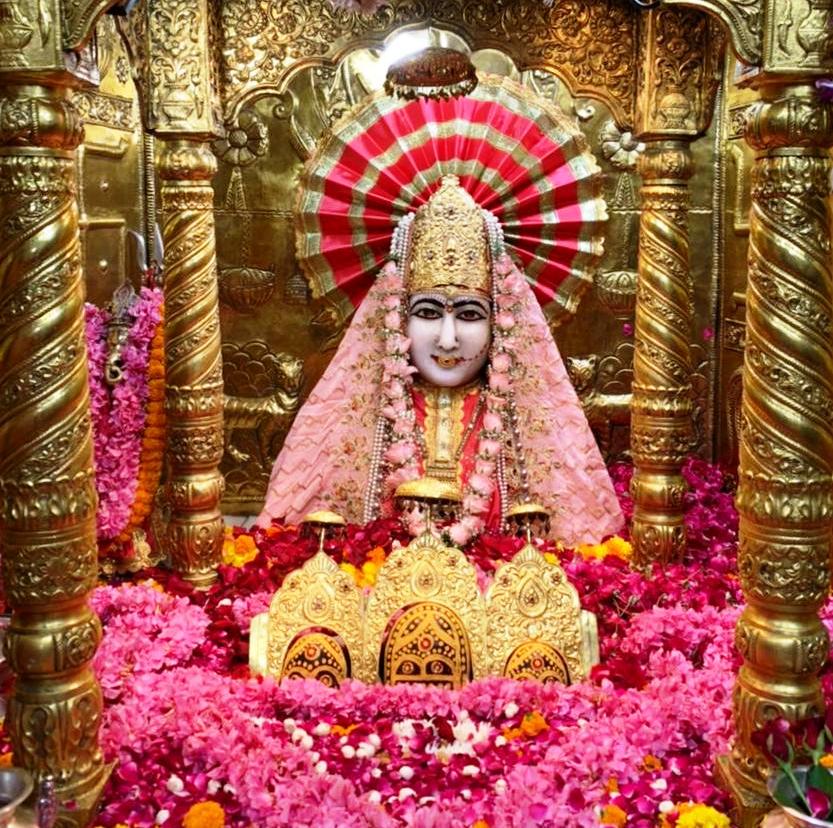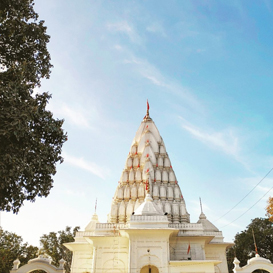



According to a story, in the Shivalik Hills, a cow used to arrive every day and offer milk at 3 adjoining stones(Pindies) places on hilltop. It was observed by local resident that's there were 3 Holy Shilas originated and they started Worshiping & and it was found to be the forehead of Shri Sati.
Accordingly a temple was constructed finallyMaharaja Gopal Singh of Manimajra constructed the present main temple of Shri Mansa Devi, which is situated on the Shivalik foothills in village Bilaspur, Tehsil and District Panchkula, during the period 1811-1815. At a distance of 200 meters from the main temple, the Patiala temple which was got constructed by Sh. Karam Singh, the then Maharaja Patiala in the year 1840.
This temple had the patronage of Manimajra State. After the merger of princely states into Pepsu the Patronage of State Govt. ended and the temples remained neglected. The raja of Manimajra then appointed pujari as ' khidmatuzar' of this temple whose duty was to worship the deity of the temple.
After the merger of princely State into Pepsu these pujaris became independent on the matter of controlling and managing the affairs of the temple and the land attached to the temple. They could neither maintain this temple nor provide necessary facilities to the visiting devotees and thus the condition of the temple deteriorated day by day.
So much so that there were no proper arrangements for pilgrims. It is said that in the place where the Mata Mansa Devi temple is today, here the next part of Sati Mata's head was dropped. The temple of Mansa Devi was first known as the temple of Mata Sati. It is believed that King Gopaldas of Manimajra built a cave from his fort to the temple, which is about 3 kilometers long.
He used to go with his queen everyday to see Mother Sati from this cave everyday. By the time the king did not appear, the cupboard of the temple did not open.
With supporting text below as a natural lead-in to additional content.

Nestled in the foothills of the Shivalik mountain range, the beautiful temple complex is spread over an area of 100 acres bordering the village of Bilaspur, near Mani Majra, in the Panchkula district of Haryana. The Mansa Devi Temple has maintained the sanctity of being an important shrine for worshipping Shakti (Mansa Devi), the divine feminine personification of the innate cosmic energy that is said to epitomize and rule the forces of the universe, in Hinduism and Shaktism.
The entire temple complex is spread over an area of about 100 acres of the Shivalik foothills. The main attraction of the temple is formed by a tree around which devotees tie sacred threads to get their prayers answered.
It is wonderfully designed with the main temple having thirty-eight panels of wall paintings, besides floral designs all over the walls and ceiling. Constructed during the early 19th century by Maharaja Gopal Singh, it is one of the most renowned Shakti temples in North India.
Shaktism is one of the most followed beliefs in this part of the country, with important Mansa Devi shrines in many of the northern states. The temple is now maintained as a heritage site by the government. Drenched in legends and myths, a vibrant atmosphere is ever-present here.